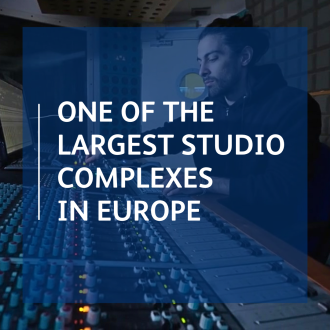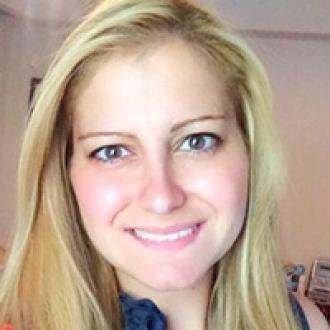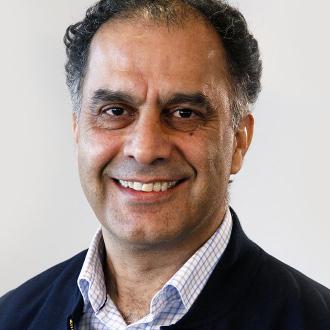- Undergraduate
Audio Software Engineering BSc (Hons)
Overview
Why study at the University of West London?
- Ranked 30th university in the UK - The Guardian University Guide 2025
- Our Music courses are ranked #2 in London for modern universities* - Guardian University Guide 2025
- Number 1 London university for overall student satisfaction - National Student Survey 2024**
- Best university for Student Experience and Teaching Quality in the UK - The Times and Sunday Times Good University Guide 2024
This degree in audio software engineering will enable you to find work in a range of industry sectors where audio software, coding and development are part of the skillset employers are looking for.
Audio software engineering is a field at the intersection of many disciplines that have boomed over the past few decades.
During the course, you will look at how advances in software to create, manipulate and represent audio in creative ways, have radically changed our approach to and relationship with audio.
This multidisciplinary degree contains a number of interlocking subject areas that progress through the course allowing you to develop and reinforce your knowledge and skills both collectively and separately.
By the end of the course, you will have a huge array of marketable skills under your belt as an audio software engineer and will be able to apply them for a range of purposes in the industry.

Select your desired study option, then pick a start date to see relevant course information:
Start date:
If your desired start date is not available, try selecting a different study option.
Why study Audio Software Engineering with us?


What our students say…
The course helped me critically think what I was doing to sound at all stages of recording in both the analogue and digital domain. This helped me achieve the sounds I wanted to create.




Course detail & modules
We live in a fast-paced world where ultra-fast broadband, cloud storage and computing, are widely available. We are consuming media, gaming and using smart devices, all of which require audio.
Through the course study material, you will look at how audio is being produced for music, video, games, broadcast, performance, and many additional areas.
Consumers and producers are demanding more sophisticated and broad-ranging applications that include audio as a component.
Become part of the response to these needs, through developing specialised skills in:
- coding and software development
- digital signal processing
- audio engineering and production
- artificial intelligence
The course will give you the theoretical underpinning and practical skills so you can work and adapt to changes in technology and the industry.
Explore our Computing Labs and Music Technology Facilities for more information about our exceptional equipment.
Compulsory modules
-
Theory of Sound
The aim of the module is for you to understand the theories and parameters relating to sound engineering that apply to all areas of the course. The main subject areas include; human hearing, physics of sound, sound measurement and decibels, basic room acoustics and digital audio conversion.
-
Engineering Software
The module will help you develop as programmer using C++ as a toon to build simple applications related to sound engineering. You will learn to specify, develop and test software to specified standards to meet a range of sound engineering needs.
-
Production and Critical Listening
The module is designed to introduce you to modern audio production processes and how to listen to sound in an objectively critical manner. You will study relevant hardware, digital audio workstations and MIDI sequencer packages. A programme of ear training will develop your critical listening skills on recorded sound and their musical attributes.
-
Quantitative Tools for Audio
In this module, you will cover the essential computational skills necessary for audio software engineering. With an emphasis on digital signal processing, this module delves into crucial mathematical principles including linear algebra, calculus, and discrete mathematics.
You'll explore algorithms and data structures specific to audio applications. By the end of this course, you will be equipped with the tools needed to excel in the design and implementation of advanced audio software systems.
-
Algorithms and Data Types
This module will help you to gain the knowledge and competence to deal with basic data structures and algorithms. You will learn how to specify collections using abstract data types (ADTs) and to implement them using a variety of techniques such as linked lists and trees. You'll also use a range of algorithms, including searching and sorting.
-
Data Communications
This module adopts a top-down approach to data communication networking, beginning at the application layer and working down towards the physical layer. After completing the five-layer network architecture, the module focuses on wireless network and its security. In summary, the following aspects will be covered:
- application layer
- transport layer
- network layer
- data link layer
- 802.11 WIFI protocol
- principle of cryptography
- Wireless security: WEP and WPA
Compulsory modules
-
Sound Design and Synthesis
Sound design is used in many industry sectors, including; film, TV, radio, gaming, advertising, theatre, virtual reality and smart devices. You will learn how to use synthesisers, samplers, how to record on location and how to creatively process sound files. You will apply sound design techniques to fulfil specific professional media briefs.
-
Embedded Systems for Audio Technology
Embedded systems are those that combine computers and electrical systems, such as an audio interface. The module provides a background to embedded development, introduces open-source tools and techniques used in the audio industry to programme embedded hardware, and enables the you to gain experience in programming languages and techniques, typically used for mobile and embedded applications.
-
Artificial Intelligence
In this module you will gain insights into key techniques within the field of artificial intelligence (AI). Aspects of AI you'll cover include agents, environments and learning as well as techniques such as regression, classification, clustering, reinforcement learning, learning recommendation and decision support systems.
-
Mobile Web App Development
This module will allow you to gain experience in developing mobile web applications, and have an introduction to the tools, languages and design techniques required for building functional applications. During the module you will gain exposure to a programming language that can support native mobile application development, and you will be introduced to the Model-View-Controller (MVC) software design pattern.
-
Games, Simulations and Virtual Worlds
This module covers the holistic development of a computer game, simulation or virtual world. Though the assessment brief is negotiable, students will be expected to use an appropriate 3D games engine (e.g. Unreal Engine 4), optionally employing a programming language (C script) to develop an interactive artefact.
-
Mathematics for Audio and Signal Processing
The module initially will provide a foundation on the basics of signal theory, including the types of signals, properties and applications of signals, conversion between analogue and digital signals.
The basic principle of frequency domain will be studied along with the fundamental signal analysis in frequency domain, e.g. complex signal and the Fourier series.
Through this module, the current software, such as MATLAB, will be used as a tool to explore the various theoretical, analytical and experimental aspects of the syllabus.
Compulsory modules
-
Audio Digital Signal Processing
You will be introduced to the fundamentals of digital signal processing. This knowledge will then be applied to audio as both a tool for developing audio effects but also for audio analysis. You will learn how to develop your own adaptive digital audio effect. Additionally, the module will look at convolution, filter design and audio restoration.
-
Artificial Intelligence for Audio
The module aims to provide you with basic concepts, audio processing methods, and insights into some techniques within the field of artificial intelligence.
You will learn audio features and how to extract acoustic features from audio streams and theory of audio signal processing, including audio activity detection and audio noise reduction. The basic principle of machine learning approaches to audio recognition will also be studied.
-
Audio Programming for Games
Gaming is a fast-growing and lucrative area of the entertainment industry. By the end of the module, you will have a solid appreciation of the power of audio for games, combined with the skills to develop audio assets and implement them in middleware. This in turn will form the basis of a show-reel which can be used for future promotion and collaboration within the gaming industry.
-
Industry Practice
This module aims to provide a wider awareness of the key trends and areas of growth in industry to further extend your range of reflective experiences and enhance your academic self-esteem.
You are required to develop your career management plan by matching job roles to personal skills and interests, plus explore the expectations society and business has of IT professionals. You will prepare for wider IT industry requirements for codes of practice and ethics and develop an understanding of the roles and activities of a modern software engineer, and the wider structure of the supply community.
-
Audio Software Project
The aim of the final major project is for you to develop the ability to undertake a large-scale project in audio software engineering, which allows you to apply your knowledge and skills developed throughout the course in an expansive and challenging manner.
This is an opportunity for you to showcase your academic as well as practical subject skills in a manner that will help you showcase your abilities to a future employer or academic institution. Ultimately, leading you into your chosen career as an audio software engineer.
Entry requirements
These can include:
- A Levels at grade B, B and C, or above
- BTEC Extended Diploma with Distinction, Merit, Merit
- Access to HE Diploma
You also need GCSE English (grade 9 – 4 / A* - C) or Level 2 equivalents and GCSE Maths (grade 9 – 5 / A* - B) or Level 2 equivalents.
Looking for BSc (Hons) Audio Software Engineering with Foundation Year?
Mature applicants (aged 21+): If you do not hold the qualifications listed but have relevant work experience, you are welcome to apply. Your application will be considered on an individual basis.
Level 5 (year 2) entry
To directly enter the second year of this course you will need to show appropriate knowledge and experience. For example, you are an ideal candidate if you have 120 undergraduate credits at Level 4 or a CertHE in a related subject area.
Level 6 (year 3) entry
To directly enter the third year of this course you need to show appropriate knowledge and experience. For example, you are an ideal candidate if you have 240 undergraduate credits (at Levels 4 and 5), a DipHE, Foundation Degree or HND in a related subject area.
Looking for BSc (Hons) Audio Software Engineering with Foundation Year?
You need to meet our English language requirement - a minimum of IELTS 5.5 for each of the four individual components (Reading, Writing, Speaking and Listening). Visit our English language requirements page for information on other English language tests we accept.
You also need academic qualifications at the same level as UK applicants. In some countries where teaching is in English, we may accept local qualifications. Check for local equivalents.
We offer pre-sessional English language courses if you do not meet these requirements.
Looking for BSc (Hons) Audio Software Engineering with Foundation Year?
Mature applicants (aged 21+): If you do not hold the qualifications listed but have relevant work experience, you are welcome to apply. Your application will be considered on an individual basis.
Level 5 (year 2) entry
To directly enter the second year of this course you will need to show appropriate knowledge and experience. For example, you are an ideal candidate if you have 120 undergraduate credits at Level 4 or a CertHE in a related subject area.
Level 6 (year 3) entry
To directly enter the third year of this course you need to show appropriate knowledge and experience. For example, you are an ideal candidate if you have 240 undergraduate credits (at Levels 4 and 5), a DipHE, Foundation Degree or HND in a related subject area.
Looking for BSc (Hons) Audio Software Engineering with Foundation Year?
Fees & funding
Please note:
- Fees for the 2026/27 academic year and onwards may be subject to Government regulation and change.
- Tuition fees are charged for each year of your course. If your course runs for two years or more, you will need to pay the fee for each academic year at the start of that year.
- If your course runs for less than two years, the cost above is for your full course and you will need to pay the full fee upfront.
- If no fee is shown above then the fees for this course are not available yet. Please check again later for updates.
Funding your studies
You may be eligible for a student loan to cover the cost of tuition fees, or a maintenance loan. Additional funding is available to some types of students, such as those with dependants and disabled students.
We offer generous bursaries and scholarships to make sure your aspirations are your only limit. In recent years, hundreds of students have received our Full-time Undergraduate Student Bursary.
Additional scholarships specifically for computing and engineering students are also on offer.
View full details, including conditions and eligibility.
Please note:
- Fees for the 2026/27 academic year and onwards may be subject to Government regulation and change.
- Tuition fees are charged for each year of your course. If your course runs for two years or more, you will need to pay the fee for each academic year at the start of that year.
- If your course runs for less than two years, the cost above is for your full course and you will need to pay the full fee upfront.
- If no fee is shown above then the fees for this course are not available yet. Please check again later for updates.
International students - funding your studies
We offer scholarships for international students including International Ambassador Scholarships.
Further information about funding and financial support for international students is available from the UK Council for International Student Affairs.
Teaching staff

Nino Auricchio
I am a Senior Lecturer in the School of Computing and Engineering, and a composer of electronic music. I also produce funk and soul music, and am involved in mixing production for house and electronic acts. I am a member of the Audio Engineering Society.
I am a Senior Lecturer in the School of Computing and Engineering, and a composer of electronic music. I also produce funk and soul music, and am involved in mixing production for house and electronic acts. I am a member of the Audio Engineering Society.
Study & career progression

Once you graduate you could go to work in:
- signal processing for audio
- immersive audio (3D)
- broadcasting and online delivery
- audio for games
- audio for telecommunications
- audio forensics
- audio recording and mastering systems
- automotive audio
- coding of audio signals
- fibre optics for audio
- hearing and hearing loss prevention (Audiology)
- high-resolution audio for music and server-based audio
- network audio systems
- semantic audio analysis
- archiving, restoration and digital libraries.
You may also want to progress your studies to explore a related field or specialise on a postgraduate course.
How to apply

Head to the UCAS website where you can apply using:
- our institution code - W05
- the UCAS course code (below)
Want to ask us a question first? We would love to hear from you. Contact us free on:
Apply for this course
- Institution code
- W05
- UCAS code
- currentVariantData.field_p_cv_ucas_code
Next steps after making your application
We aim to make a decision on your application as quickly as we can. If we need any more information about your qualifications, we will be in touch.
In the meantime, come and visit us and find out more about what studying at UWL is like. Sign up for an open day or join a campus tour.
Visit us and see for yourself
Talk to our tutors and find out about our courses and facilities at our next open day or join a campus tour.
Our prospectus
All of our courses in one place - download now or order a hard copy.
We're here to help
Any questions about a course or studying at UWL? We're here to help - call us on 0800 036 8888 (option 2, Monday – Friday 10am-4pm) or email us on courses@uwl.ac.uk.

You can apply online at any time by following the link below.
Our application form will ask you for some information about what you want to study, your previous qualifications or experience, and how we can contact you.
Want to ask us a question first? We would love to hear from you. Contact us free on:
- 0800 036 8888
- courses@uwl.ac.uk
Apply for this course
Next steps after making your application
We aim to make a decision on your application as quickly as we can. If we need any more information about your qualifications, we will be in touch.
In the meantime, come and visit us and find out more about what studying at UWL is like. Sign up for an open day or join a campus tour.
Visit us and see for yourself
Talk to our tutors and find out about our courses and facilities at our next open day or join a campus tour.
Our prospectus
All of our courses in one place - download now or order a hard copy.
We're here to help
Any questions about a course or studying at UWL? We're here to help - call us on 0800 036 8888 (option 2, Monday – Friday 10am-4pm) or email us on courses@uwl.ac.uk.

You can apply to us in two ways:
- on the UCAS website you will need our institution code (W05) and the UCAS course code (at the top of this page)
- directly on our website – follow the ‘apply now’ link below
Want to ask us a question first? Our dedicated international students’ team would love to hear from you.
- Ask the International Recruitment Team a question
- learn more about international student applications
- find out more about why you should study in London at the Career University.
Apply for this course
Next steps after making your application
We aim to make a decision on your application as quickly as we can. If we need any more information about your qualifications, we will be in touch.
In the meantime, come and visit us and find out more about what studying at UWL is like. Sign up for an open day or join a campus tour.
Visit us and see for yourself
Talk to our tutors and find out about our courses and facilities at our next open day or join a campus tour.
Our prospectus
All of our courses in one place - download now or order a hard copy.
We're here to help
Any questions about a course or studying at UWL? We're here to help - call us on 0800 036 8888 (option 2, Monday – Friday 10am-4pm) or email us on courses@uwl.ac.uk.
Search for courses
Student life at UWL
Important notes for applicants
Disclaimer
*Modern universities - defined as higher education institutions that were granted university status in, and subsequent to, 1992.
**The National Student Survey 2023 and 2024 - Average of answers to all questions by registered student population. Excludes specialist institutions.
Testimonials - our students or former students provided all of our testimonials - often a student from the course but sometimes another student. For example, the testimonial often comes from another UWL student when the course is new.
Optional modules - where optional modules are offered they will run subject to staff availability and viable student numbers opting to take the module.
Videos - all videos on our course pages were accurate at the time of filming. In some cases a new Course Leader has joined the University since the video was filmed.
Availability of placements - if you choose a course with placement/internship route we would like to advise you that if a placement/internship opportunity does not arise when you are expected to undertake the placement then the University will automatically transfer you to the non-internship route, this is to ensure you are still successful in being awarded a degree.









